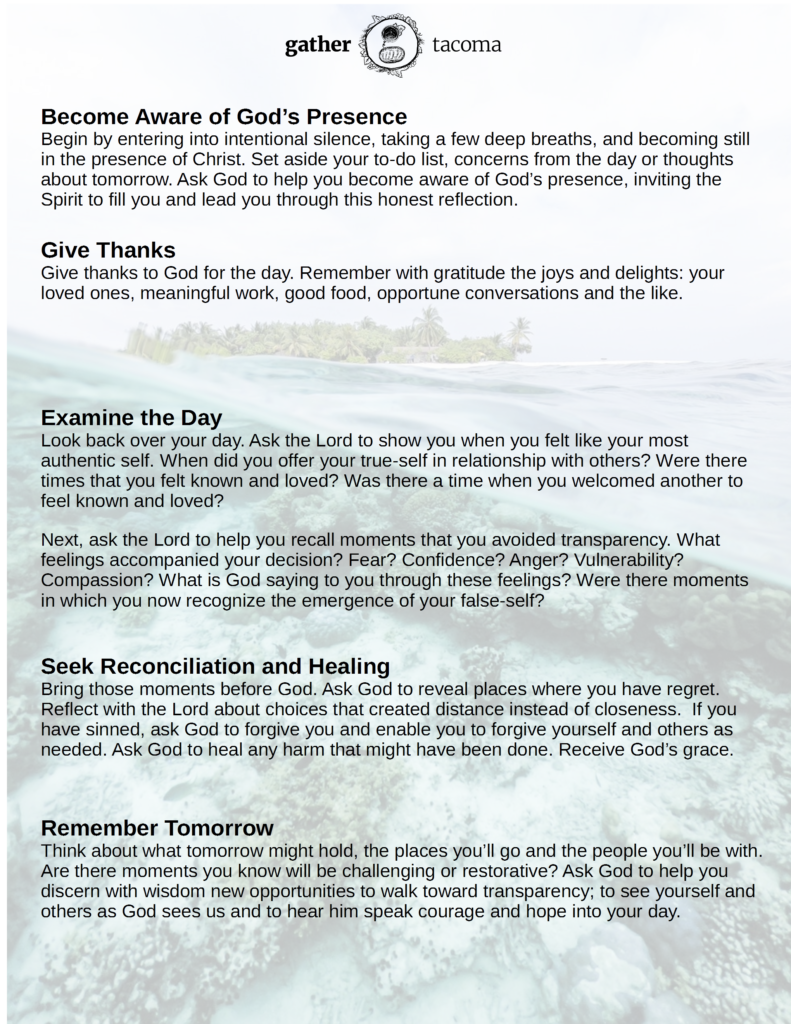For part one of this series click here
So, what is transparency?
Perhaps it’s easier to start with what it is not. Transparency is not brutal honesty or the lack of a filter. It is not living like you’re in a real-time confessional. It doesn’t mean sharing every single thought that comes to mind or disclosing every emotion as you feel them.
At the heart transparency is soul-searching honesty. Transparency is a posture of authenticity with yourself, God, and others about your feelings, your fears, and your hope. This is something many people desire, even if they can’t quite articulate it. We all need fellow travelers who are showing us what it means to see and be seen; to know and be known; to be your most authentic and true self.
True Self/False Self
Yet, we all struggle to inhabit our true self. In Ephesians Paul admonishes the church at Ephesus to:
“put off your old self, which is being corrupted by its deceitful desires; 23 to be made new in the attitude of your minds; 24 and to put on the new self, created to be like God in true righteousness and holiness”
(Eph. 4:22-24).
Our false self is the identity we’ve created for ourselves outside of Jesus. It is our fear of what others think. It is our desire to control perceptions and outcomes. It is the pressure we put on ourselves to be successful and important. Fr. Richard Rohr talks about the false self as who you think you are or maybe even who you feel you need to be, in order to navigate the social constructs you’ve adapted to over the course of your life. Everyone struggles with their false self because we are all constantly being tempted to find our identity outside of Christ.
We struggle with false self because we are constantly tempted to find our identity outside of Christ. ~ Taeler Morgan Click To TweetIn contrast, your true self is who you are in Christ. It is the branch connected to the vine, it is where we experience freedom, authenticity, contentment, and ultimately where our ability to inhabit a posture of transparency and trust resides. In The Gift of Being Yourself, David Benner writes,
“The goal of the spiritual journey is the transformation of self… this requires knowing both our self and God. Both are necessary if we are to discover our true identity as those who are ‘in Christ’ (2 Cor. 5:17), because the self is where we meet God. Both are also necessary if we are to live out the uniqueness of our vocation.”
That is true for each of us as individuals, but it is also true for our communities. In order for our communities to live out their vocation we must learn to identify the patterns of our false self, relinquish our fears to God, and venture into the trust, transformation, and transparency that our true self desires.
Examen
As I reflected on this early part of our journey I began to experiment with developing an Examen of Transparency as a way of cultivating an awareness of the places in our daily life where we are saying yes to authenticity in relationship, when we are saying no, when our false self is showing up, and when we feel that peace and contentedness that comes from living in our true selves. It is a tool my community has used both individually and as a group spiritual practice to help us inhabit a posture of transparency and trust in ourselves and our life together.

A Cyclical Process
You may have noticed that this process is cyclical, not linear. As communities of people we are always bumping up against conflict. Over time, as we engage with our true selves more fully we may find that moving from conflict, through fear, to trust, and transparency happens more smoothly. But it is a process we enter repeatedly and that is a gift because every time we enter it, we are changed.
God is not just inviting us to plant a church. God is inviting us to be remade in Christ-likeness. God is inviting us to cultivate safe places to be authentic with our fear, practice trust, experience transformation, and become more transparent together. We all have dreams of what the perfect community looks like, but the good news is that God’s dream for us and our communities is so much more meaningful and beautiful than anything we could ever hope for or even imagine.

Share this Post

